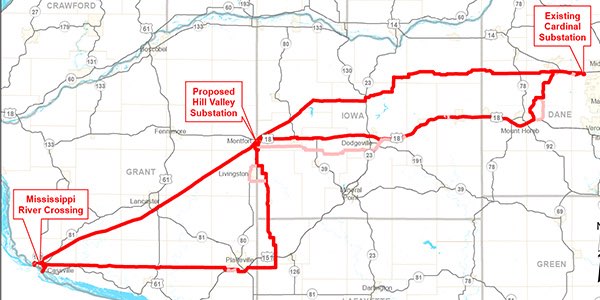By Amanda Durish Cook
The Wisconsin Public Service Commission on Tuesday authorized the contentious Cardinal-Hickory Creek transmission line, sanctioning MISO’s last remaining multi-value project eight years after the RTO’s approval.
The unanimous, verbal approval from commissioners for a certificate of public convenience and necessity at its open meeting was considered preliminary (5-CE-146). A PSC staffer told RTO Insider that a written order will now be drafted and put before the commission for final approval in September.
The PSC concluded that the line will reduce congestion charges, improve reliability and boost transfer capability between Wisconsin and wind-rich Iowa to its west. The commission said the line could facilitate up to 8.4 GW of new generation.
“Transmission is the backbone of clean energy alternatives to fossil fuel,” Commission Chair Rebecca Cameron Valcq said in a press release following the meeting. “Getting low-cost, clean energy from where it is plentiful in the west to where it is needed, and at the scale that it is needed, cannot be done without building transmission infrastructure. I support this project because I firmly believe that it will provide tangible economic and reliability benefits to Wisconsin customers and will serve as the cornerstone to achieving a zero-carbon future.”
The nearly $500 million project has pitted environmental and renewable energy organizations against one another, with some arguing the line is needed to transport growing wind power and others contending that it is unnecessary and would destroy portions of the state’s Driftless Area. (See Environmental Groups Divided on Cardinal-Hickory Creek Line.)
Last month, attorneys general for Illinois and Michigan filed a brief with the Wisconsin PSC objecting to the cost of the 345-kV line, which will be shared on a load-ratio basis in MISO. Wisconsin commissioners said they would take the states’ stance under advisement. Democratic and Republican politicians stationed along the line’s route sent opposition letters to the commission as well.
The approximately 100-mile line would connect northeast Iowa with southwestern Wisconsin. It still needs approval from the Iowa Utilities Board, which will hear the case in December. The U.S. Fish and Wildlife Service and the U.S. Army Corps of Engineers also have yet to grant permission for the line to cross the Mississippi River.
Developers American Transmission Co., ITC Midwest and Dairyland Power Cooperative said they will begin to contact Wisconsin property owners along the route this fall. Construction is expected to begin in October 2020, with the line in service by December 2023.
“We are pleased that in addition to the reliability and economic benefits, the PSC has also recognized the importance of this project as a way to support the changing energy mix in Wisconsin and across the Upper Midwest,” ATC Director of Environmental and Local Relations Greg Levesque said in a statement.
Dairyland Vice President of Power Delivery Ben Porath said the line will deliver “substantial benefits to Wisconsin in excess of the costs of the line.”
The line is the last of MISO’s 17-project multi-value portfolio to scale the state approval process.
Lingering Opposition
Public opinion remains divided, however. Driftless Area Land Conservancy Executive Director David Clutter said his organization hoped the Wisconsin commissioners would reconsider their decision before rendering a final order and promised an appeal if the preliminary order stands.
“The commission’s own staff testified that this transmission line is not the most economical option in most modeling scenarios. It’s not needed for energy demand nor reliability to keep the lights on. We expect that this decision will be challenged before federal and other state agencies, and in the courts if necessary,” Clutter said in a statement.
In its analysis, the Wisconsin PSC found Cardinal-Hickory Creek could result in negative economic benefits in several of the hypothetical cases it studied. Projects in MISO’s multi-value portfolio were studied as a package; individual projects weren’t studied in isolation.
Clutter also noted the thousands of Wisconsin residents that submitted comments and testified at public hearings against the project, saying the PSC’s decision was “not supported by expert witness testimony, the PSC’s own staff testimony or thousands of members of the public.”
The conservancy was one of the voices clamoring for a combination of lower-voltage lines, battery storage, solar generation, energy efficiency and other distributed resources as an alternative to the line.
“Wisconsin needs to transition to renewable energy, and we can do so without damaging the natural areas and special places of our Driftless Area. There are better clean energy solutions and alternatives for Wisconsin. The PSC’s decision will result in higher utility rates in Wisconsin and across the Midwest and will allow ATC and ITC to condemn private land through eminent domain,” Clutter said.
The three developers contend that 95% of the selected 100-mile route uses existing utility and interstate or U.S. highway corridors.
Wisconsin Wildlife Federation Executive Director George Meyer said his group “will continue to challenge this destructive transmission line before federal and other state agencies, and in the courts if necessary.”
“The construction and maintenance of the proposed line and very high towers will have significant and undue adverse impacts on environmental values, including land and water resources,” Meyer said.
But the PSC’s preliminary decision was cause for celebration for renewable energy advocacy group Clean Grid Alliance.
Executive Director Beth Soholt said the group was grateful to the commission “for recognizing that more transmission is necessary in order to deliver the clean energy future everyone wants.”
“The demand for more renewable energy is palpable, and the Cardinal-Hickory Creek transmission line will provide the ability to access and deliver renewables. We are seeing an ever-increasing stream of state governments, utilities and corporations announcing plans for more renewable energy because of its low cost and environmental benefits,” Soholt said.




